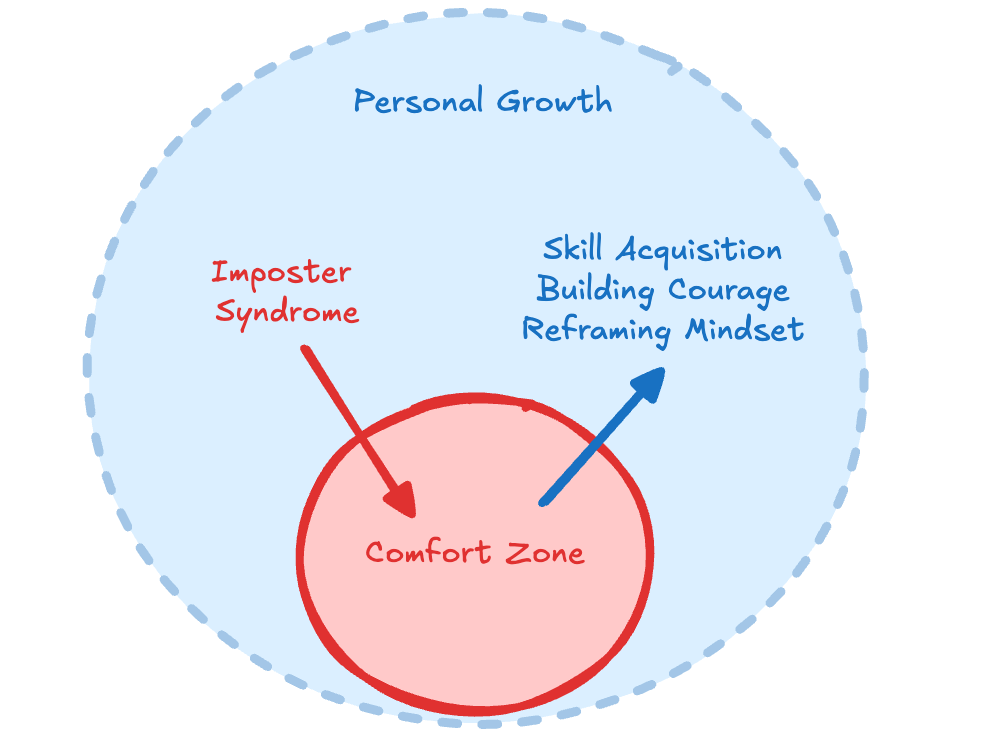How to Tame Imposter Syndrome
Imposter syndrome is not something we get rid off. Instead, it is a natural feeling when we try something new outside our comfort zone, and the goal is to hear it, acknowledge it, and then manage it.
Yue’s Coaching Corner
It’s been a busy two weeks with corporate workshops. Last week, I did a workshop for the Vamos! ERG at Thumbtack on How To Uplevel Executive Communication with AI. This week, I ran a leadership offsite at Travel Perk on topics like situational leadership, building belonging, and becoming authentic leaders. Looking for a speaker for your offsite or team event? Learn more here.
September has been a record month with 6 new 1:1 executive coaching clients and more in the process. Performance reviews upcoming? Annual planning season? AI adoption not going as well as hoped? Hop on a free intro call and see if 1:1 executive coaching with me is a fit for you.
“I’ve never seen anyone speak up like that and defend their viewpoint with the CEO!” said a designer on my team after an intense leadership review. “Were you scared? Were you worried about being wrong?”
I was scared. Terrified even. It was the most senior and high-powered room I’d been in at that point in my career. The team and I had spent months preparing the pitch and business case. And the CEO was skeptical.
A voice in my head shouted at me: “What if you’re wrong? What if everyone thinks it’s a dumb idea? You didn’t prep enough. You’re going to let your team down.”
It continued: “You don’t want to put yourself out there! What if no one supports you? You could get fired! And your career will be over.”
This is imposter syndrome, the feeling that I didn’t deserve to be there, that I didn’t know what I was doing. It turns out that imposter syndrome is a very human emotion that arises whenever we try something new. It is a protective part of us whose job is to ensure we don’t get killed taking risks and venturing into the unknown. It generates a gravitational pull back to our comfort zone. It is not a bug in the system.
And just because it exists doesn’t mean it is right. Imposter syndrome is not based on data or facts. It doesn’t consider how much you’ve prepared for your undertaking. It doesn’t know you have 10 years of expertise. It is simply a voice that is triggered when you feel stress or fear while attempting something new and different.
With imposter syndrome, the goal is not to silence the voice of caution. In fact, like toddlers who want cake, trying to silence the voice makes it shout louder. Instead, the skill to learn is how to tame and manage it: how to consider its wise warnings, and then make a considered choice on how to proceed.
How to Tame Imposter Syndrome
Taming imposter syndrome requires increasing our ability to reframe our thoughts, bring in logical thinking, and build up courage.
Notice what is a matter of skill (acquisition), not inherent identity: With imposter syndrome, our inner critic will make statements about our identity. “I’m not an engineer,” or “I have no right to be here.” Consider that perhaps it is a matter of learning the skills required. You don’t know how to do something because you haven’t yet invested time and effort into learning the skills required to do what you want to accomplish, not because you innately cannot do it.
Separate the facts and skills from feelings of discomfort and uncertainty: Any time we try something new and get out of our comfort zone, these feelings arise. That does not mean that logically you are not ready or you don’t have the skills to succeed. Recall and list out your skills and qualifications. Remind yourself of all that you’ve already learned and accomplished.
Acknowledge it and get support from others: When you push away the voice or try to hide it, it gets louder. Often, finding a supportive friend, coworker, or coach to hear out your concerns will help the voice quiet down. An objective third party will point out your qualifications and skills. They can help you more logically process the pros and cons or strategize how to best proceed.
Imposter syndrome is a natural emotion that arises when we face something new. It is not an emotion to be silenced but rather tamed. Being courageous is taming the fear and taking action, not acting in the absence of fear. Imposter syndrome is the entry ticket to growth, not something to be avoided.
That’s all folks! See you next week at 3:14 pm.
Yue



Imposter syndrome often holds us back. I notice it in my work and life. How do I like to tackle it? By reframing the situation. I imagine my friend telling me that they are in such a situation. What would my response be?
Often, I realise that I would say, "You do not need to know everything. Believe in your ability to deliver!"
When I feel overwhelmed by the tasks, I always start by solving the most immediate and visible problems, I notice that they’re often the best way to build momentum.
https://open.substack.com/pub/xianli/p/why-starting-small-isnt-playing-small?r=4b54s&utm_campaign=post&utm_medium=web&showWelcomeOnShare=false